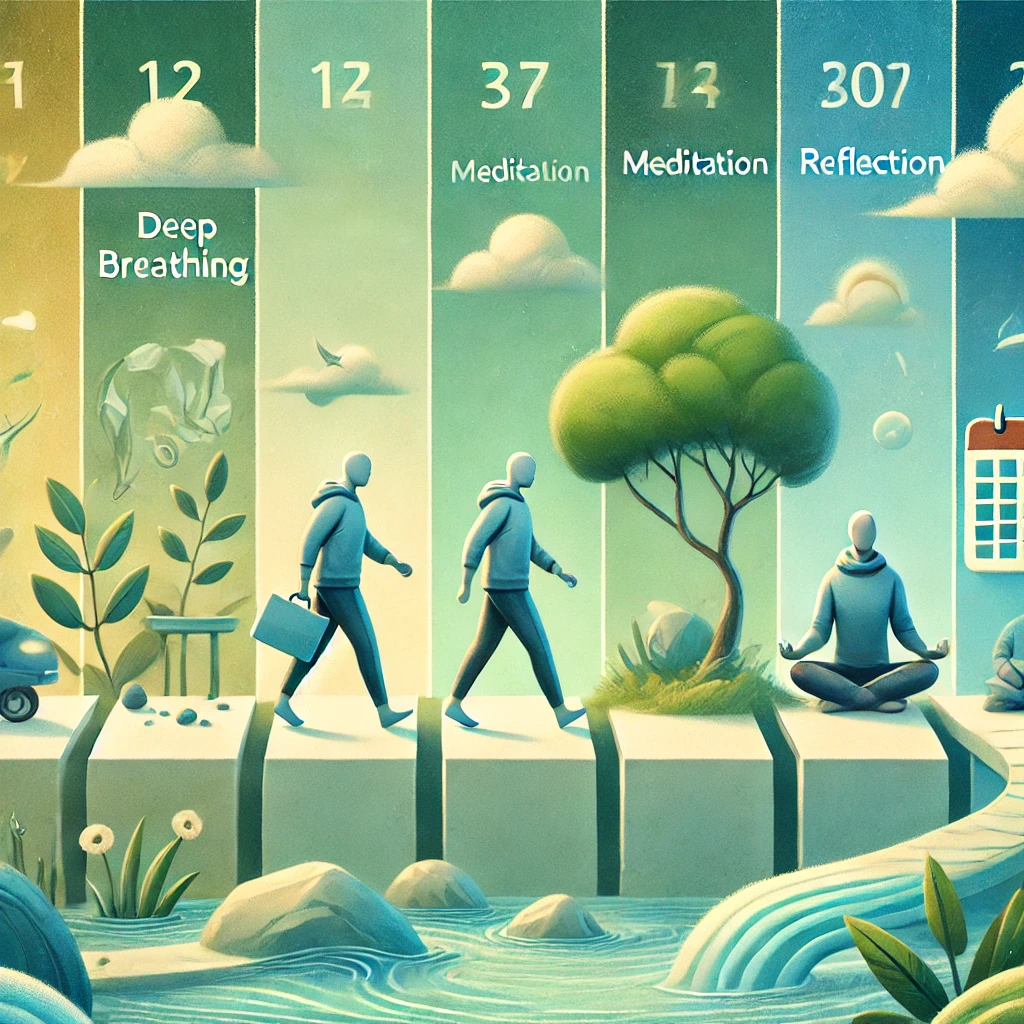Controlling anger is a process that requires consistent effort and self-awareness. By incorporating specific techniques into your daily routine, you can manage and reduce anger over time. Here’s a step-by-step guide on how to control your anger day by day:

1. Start Your Day with Mindfulness
Begin each morning with a few moments of mindfulness or meditation to set a calm tone for the day. Practicing mindfulness helps you stay grounded and more aware of your emotions, making it easier to manage them before they escalate.
- Daily Practice: Try meditating for 5–10 minutes, focusing on your breath or doing a body scan to observe any tension. Apps like Headspace or Calm can guide you.
- Outcome: By establishing mindfulness as part of your daily routine, you’ll be more in tune with your feelings, which will help you detect frustration before it turns into anger.
2. Keep a Daily Anger Journal
Keeping track of what triggers your anger can help you identify patterns and prevent future outbursts. Writing about your experiences can also serve as a release for pent-up emotions.
- Daily Practice: At the end of each day, take 5–10 minutes to write down moments where you felt angry. Record what triggered your anger, how you reacted, and what you could have done differently.
- Outcome: This process increases self-awareness, helping you recognize triggers and come up with healthier responses in the future.
3. Practice Deep Breathing Throughout the Day
Whenever you feel frustration or anger building up, deep breathing can help you stay calm. Focused breathing techniques activate the body’s relaxation response, countering the stress response that often fuels anger.
- Daily Practice: Take several slow, deep breaths (inhale for 4 seconds, hold for 4 seconds, exhale for 4 seconds) anytime you feel tension rising.
- Outcome: Deep breathing helps you release physical tension and gain control over your emotions in stressful moments.
4. Use Positive Affirmations
Positive affirmations can shift your mindset and reduce the intensity of negative emotions like anger. Remind yourself daily that you are in control of your reactions.
- Daily Practice: Use affirmations like “I am calm and in control” or “I choose to respond thoughtfully, not react impulsively.” Repeat them to yourself in the morning or whenever you feel anger starting to rise.
- Outcome: Over time, these affirmations can help retrain your mind to respond calmly instead of with anger.

5. Take Regular Breaks to Avoid Overwhelm
One of the most common triggers for anger is feeling overwhelmed by tasks or situations. Taking short breaks during the day helps you maintain your emotional balance and prevents frustration from building up.
- Daily Practice: Take a 5-minute break every hour or two. Stretch, walk, or simply step away from your workspace to reset your mind.
- Outcome: Regular breaks reduce stress and fatigue, which are often precursors to anger.
6. Focus on Problem-Solving, Not Venting
When something upsets you, focus on finding a solution rather than letting your anger build. Constantly venting without taking action can reinforce negative feelings.
- Daily Practice: When faced with a situation that frustrates you, pause to ask yourself, “What can I do to fix this problem?” Focus your energy on taking constructive action rather than dwelling on your anger.
- Outcome: Problem-solving reduces feelings of helplessness, which can be a major contributor to anger.
7. Develop Healthy Physical Outlets
Physical activity is a great way to release built-up tension and reduce anger. Regular exercise helps regulate your mood by releasing endorphins, the body’s natural stress-relievers.
- Daily Practice: Aim for at least 30 minutes of exercise, whether it’s a brisk walk, yoga, cycling, or another activity you enjoy.
- Outcome: Exercise not only releases frustration but also improves your overall mood and reduces the likelihood of anger flare-ups.

8. Set Boundaries and Communicate Assertively
Anger often arises when we feel that our boundaries are being violated. By learning to communicate assertively, you can express your feelings and needs without aggression.
- Daily Practice: When something bothers you, calmly and clearly state how you feel and what you need. Use “I” statements, such as “I feel upset when meetings run over because it disrupts my schedule.”
- Outcome: Assertive communication prevents misunderstandings and ensures your needs are addressed without conflict.
9. Use Humor to Defuse Tension
Humor is a powerful tool for reducing anger. Finding something to laugh about can help you gain perspective and shift your focus away from what’s bothering you.
- Daily Practice: When you’re feeling angry, try to find humor in the situation or think of something that always makes you laugh.
- Outcome: Humor can break the cycle of negative thinking and help you manage your emotions more easily.
10. End the Day with Gratitude
Cultivating a habit of gratitude helps you focus on the positive aspects of your day, reducing feelings of anger and frustration.
- Daily Practice: Before bed, write down three things you’re grateful for, even if they are small. Focus on the good things that happened and how you handled difficult situations.
- Outcome: Gratitude fosters a positive mindset, helping you feel more content and less likely to react with anger in challenging situations.
Long-Term Strategies for Anger Control
Beyond these daily practices, it’s important to adopt some long-term strategies to strengthen your emotional regulation
 NEW! PMS Relief+ and Menopause Essentials+: Introduce PMS Relief+ and Menopause Essentials+, two innovative, hormone-free formulas designed to provide fast, long-lasting relief from the most frustrating symptoms of PMS and menopause. Whether you’re dealing with painful periods, hot flashes, irritability, or sleepless nights, these scientifically backed solutions can help you regain your vitality and mental clarity.
NEW! PMS Relief+ and Menopause Essentials+: Introduce PMS Relief+ and Menopause Essentials+, two innovative, hormone-free formulas designed to provide fast, long-lasting relief from the most frustrating symptoms of PMS and menopause. Whether you’re dealing with painful periods, hot flashes, irritability, or sleepless nights, these scientifically backed solutions can help you regain your vitality and mental clarity. 

